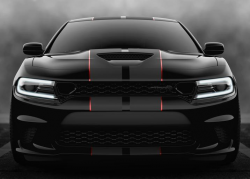
— A Dodge class action lawsuit has been dismissed over 2014-2019 Challengers and Chargers allegedly equipped with faulty rear differentials.
The Charger Hellcats, Challenger Hellcats and Demons are equipped with V8 engines.
“The Class Vehicles all bear FCA’s Street & Racing Technology (‘SRT’) badge, indicating these are high-performance vehicles designed to be driven on both ordinary public roads and for speedways, dragstrips, and other track use.”
According to the Dodge class action lawsuit, the rear differentials cannot handle the torque loads of the engines and transmissions during acceleration. This wears out the differentials and causes failures of the ring gears, pinion gears, differential housings and axles.
The six owners who sued allege Fiat Chrysler (FCA) knew the rear differentials were defective when the Dodge Chargers and Challengers were sold. Not only were the cars not safe for public roads, but the vehicles allegedly couldn't cope with track driving.
The class action alleges metal shavings contaminate the differential oil which increases friction and heat. This allegedly wears out the differential components and causes axle failures.
Based on documents filed for the lawsuit, the rear differentials can allegedly explode and send shrapnel into the undercarriage areas.
The plaintiffs claim they have lost confidence in the Dodge SRT cars because the vehicles are unfit to drive on public roads. The plaintiffs also assert they were misled by Chrysler's advertising for the Dodge Challengers and Chargers and won't purchase those models ever again.
In addition, the Dodge class action lawsuit alleges repairs require complete replacement of the rear differential because, “rear differentials in the Class Vehicles are not fully serviceable with replacement parts; as such, when the rear differential experiences the symptoms of the Defect . . . the only viable option is to replace the entire differential.”
And although Chrysler didn't go after this specific argument, the car owners complain they were unaware that "executing aftermarket repairs could void the express warranties for the entire Class Vehicle[s].”
Dodge Class Action Lawsuit Dismissed
In dismissing the class action lawsuit, the judge looked at the argument from the plaintiffs concerning the expenses related to the rear differentials.
"Costs to repair or replace a rear differential in the Class Vehicles often run thousands of dollars, excluding any other repairs necessary to the other vehicle components that may have been damaged by the defective rear differential.”— Dodge class action lawsuit
The judge noted how four of the plaintiffs tried to show the damages they allegedly suffered due to having to repair or attempt to repair their Dodge SRT cars. The remaining two plaintiffs didn't claim their cars had any rear differential problems.
Two of the plaintiffs claim they, "repeatedly took their vehicle[s] to an authorized FCA dealership and requested warranty repairs.”
But according to the judge, although the plaintiffs claim they suffered damages, the plaintiffs admit none of them paid for any repairs to their Dodge cars.
In ruling to dismiss the case, the judge said the plaintiffs lack standing to seek restitution and to bring claims under the laws of states in which they do not reside and in which none of their injuries are alleged to have taken place.
According to the judge, the plaintiffs also lack standing to seek restitution because they relied on conclusory statements rather than well-pleaded facts. And while the class action lawsuit alleges Chrysler made unlawful profits by selling the Dodge SRT cars, the judge ruled the claim is also conclusory.
The judge also dismissed fraud and contract claims because the plaintiffs "failed to allege any actionable omission, concealment, or misrepresentation by FCA as to the Differential Defect." In addition, a claim was dismissed as time-barred and two claims were dismissed for a lack of privity.
Although the judge dismissed the Dodge class action lawsuit, the plaintiffs are allowed to amend the complaint if they choose.
The Dodge class action lawsuit was filed by these six plaintiffs.
- Gustavo Diaz (California): 2015 Dodge SRT Challenger Hellcat
- Christian Gibson (Florida): 2018 Dodge Challenger Demon
- Joseph Santos (California): 2016 Dodge Charger Hellcat
- Gerald Sinclair (Florida): 2016 Dodge Charger Hellcat
- Marvin Leon Veal (Florida): 2019 Dodge Charger Hellcat
- Domenick Scorziello (New York): 2018 Dodge Challenger Demon
The Dodge class action lawsuit was filed in the U.S. District Court for the District of Delaware: Diaz, et at., v. FCA US LLC.
The plaintiffs are represented by Berger Montague PC, Capstone Law APC, and Gordon & Partners, P.A.




